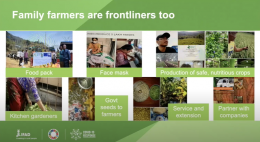“Family farmers are frontliners, too, especially in the work to build the body’s resilience and resistance to COVID-19 through healthy and nutritious food,” says AFA Secretary-General Esther Penunia during the IFAD live webcast “Farmers on the Frontline – Building resilience in a post-Coronavirus world” broadcasted on 8 May 2020.
Family farmers in Asia and the Pacific region are IFAD’s key partners in ensuring food and nutrition security. However, they are hardly hit by the crisis brought by the COVID-19 pandemic.
In her presentation, Penunia discussed the challenges currently faced by family farmers in the Asia-Pacific region.
In many countries in the region, it is the harvest season when governments imposed partial or total lockdowns to contain the virus. This move had a tremendous effect on many farmers. The lockdown prevented many farmers to go to their farms to harvest their crops due to reduced mobility. Meanwhile, those who were able to harvest do not have the means to transport their produce to the market. In developing countries, many people rely on public transportation which was also unavailable in locked-down areas. Furthermore, in some areas, markets have closed and there are simply no customers to buy their produce.
Many smallholder farmers rely only on farming for their livelihood, and not being able to work during the pandemic also meant no income for them. Moreover, as most smallholder farmers cannot afford storage facilities, tons of unsold produce were left to rot bringing huge losses for farmers. (Read: Impact of COVID-19 on Farmers in Asia and the Pacific)
“Farmers should be earning during harvest time to keep them afloat until the next production/harvest,” Penunia explains. “And there are millions of family farmers in the Asia-Pacific who are in this situation.”
These challenges are not exclusive in the rural areas. Due to the reduced supplies of fresh produce from rural areas, food has become scarce and expensive in the cities.
In addition, the sudden migration of people from urban to rural areas, in hopes of more security, would mean increased demand and pressure on already scarce land resources.
To help family farmers cope with these challenges, AFA has been doing sharing sessions among its members. According to Penunia, since early March, AFA has been on regular consultation with its members and key partners about COVID-19 and their responses to the challenges brought by the pandemic.
What has AFA been doing?
- Farmers all over Asia are continuing to produce healthy and nutritious food.
- AFFM (Myanmar) and VNFU (Vietnam) distributed food packs to needy families in locked-down areas.
- SEWA (India) members sewed face masks, distributed these to their members, and taught other members how to sew face masks so they can still make an income while in lockdown/
- Farmers are also making kitchen gardens.
- A young farmer member of PAKISAMA (Philippines) went to the country’s Agriculture department to ask for seeds. He repacked these and distributed it to the people in his community so they can start their own gardens.
- Jumer Marcaida, also a young farmer member of PAKISAMA, is providing service and extension and is actively recruiting members of their cooperative and training them for organic soya production
- Members of LFN (Laos) have secured a partnership with private companies because the videos they produced showing the challenges faced by farmers have reached the government and private entities.
- PAKISAMA and AFFM are doing direct-selling of their farmers’ produce to consumers. (Read: AFA FO initiatives for their members during COVID-19 pandemic)
Penunia says that this crisis made people realize the value of farmers producing healthy food and the government realized the value of being self-reliant in agri production. “It has confirmed our advocacy for a shorter and inclusive value and food chain,” she adds. “With the strong participation of farmers in the governance of these chains and with solidarity and cooperation, we can prevent another food and nutrition security crisis from happening.”
Penunia calls on governments and development partners to provide direct financing to farmers organizations to upscale their endeavors to raise awareness on COVID-19 in their communities and to act as government partners in the distribution of emergency food assistance especially through public procurement, to increase agriculture activity through agroecological and climate-resilient approaches in farms fishers and forest, for processing and distribution of food through post-harvest and transportation facilities including access to finance, as well as strengthening capacities in policy and program engagement with local government units.
According to Penunia, building resilience during this time of pandemic means empowering the smallholder family farmers so they can produce healthy and nutritious food and they can bring these to the market using short food chains and empowering means building their capacities to do value addition and to do direct marketing to consumers. #

Comments are closed